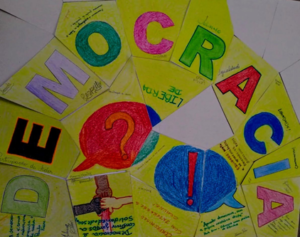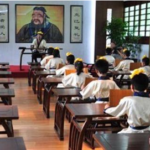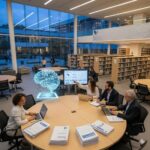Patricia Melo Magoga, Master in Philosophy of Education, Universidade Estadual de Londrina (UEL), Londrina, PR, Brazil.
Darcísio Natal Muraro, Assistant professor at the Department of Education, Universidade Estadual de Londrina (UEL), Londrina, PR, Brazil.
The article “The public school and the democratic society: Anísio Teixeira´s contribution”, by Patricia M. Magoga and Darcísio N. Muraro, published in Educação & Sociedade journal (vol. 41), aims to analyze the importance of public school in the formation of the democratic society (MAGOGA, 2020). The investigation follows a qualitative methodology of philosophical analysis of concepts and a bibliographic approach focused on Anísio Teixeira´s work, highlighting the idea of democracy as a lifestyle in which the common problems, social conflicts and interests are considered in a reflexive and investigative aspect by the involved community. Thus, democracy needs education so that everyone may learn by freely sharing experiences in its continuous restructure from its participants.
In Anísio’s view, the public school offers a democratic, critical, emancipatory education which are the basis for integration and social development. In this aspect, schools in and for a democratic society must necessarily be universal, free, mandatory, secular, and efficient, also it must constitute national policy for all governments. However, the current government’s neoliberal, fascist and anti-democratic policy imposes clear limits and setbacks for the concretion of the educational and scholar democratic proposal. Concerning this, the study presents Anísio Teixeira´s contribution of the consolidation of public school and a national education system. The education he proposed consists of creating a democratic environment – a minicommunity – provided by scholar education that demands a school built for this purpose. The work offers subsidies to face the conflict between the role of the public school, in the condition of forming sober people in a democratic society, and the market view of preparing the new generations for the technician labor market, add to the threat of excluding humanistic and cultural formation in order to maintain the ruling classes’ privileges.
The public school, proposed by Anísio, is one that enables and stimulates the plurality of social participation and considers the student’s interest in educational practice, focusing its work on the development of students’ relational, intellectual, and operational skills. This model of education is a purpose itself, that is, it educates for today, understanding education not as preparation for life, but as life itself. It is through this public school that we can make individuals realize the importance of their intellectual freedom, the development of their abilities, and how much they are strengthened when thinking and practicing together. Therefore, public school is the way to establish intellectual and political equality and freedom for all. In Teixeira’s view (1971), this is the way in which the problems of the rigid social stratification and the serious economic unevenness of Brazilian society could be faced, aiming for the creation of equal opportunities according to the essence of the democratic regime.
The research points to the need of raising awareness and fighting for democratic rights, especially in the field of public schools, and of the investment of training professional educators with a reflexive, critical, and political bias. For the democratic transformation to happen, it is also proposed the construction of educational public policies that encourage and provide opportunities for popular participation as a mean to develop citizenship habits, even if, initially, in smaller spheres. Thus, the school is no longer an institution separated from reality and becomes the space of an educational community that interacts with civil society.
The reflection upon the role of the public school, in the formation of a democratic society, becomes even more pertinent and necessary in the time that Brazil is living. The COVID-19 pandemic increased social inequality in education when it motivated the e-Learning modality as a strategy for the problem of the pause in presence classes. Hence, favoring the school of the elites, while public schools face even more technical, pedagogical, and social difficulties. Education is everyone’s right and democracy cannot tolerate the privileges of the elites.
Following, watch the video of Patricia Melo Magoga and Darcísio Natal Muraro discussing about the public school and democracy.
References
MAGOGA, P. M. Educação e democracia em Dewey e Teixeira: a possibilidade de desenvolvimento e integração social. 2020. 158 f. Dissertação (Mestrado em Filosofia da Educação) – Universidade Estadual de Londrina, Londrina, PR, 2020.
TEIXEIRA, A. Educação no Brasil. 2. ed. São Paulo: Companhia Editora Nacional, 1969.
TEIXEIRA, A. Educação não é privilégio. 3. ed. São Paulo: Companhia Editora Nacional, 1971.
TEIXEIRA, A. Pequena introdução à filosofia da educação. Escola progressiva ou a transformação da escola. 6. ed. Rio de Janeiro: DP&A, 2000.
TEIXEIRA, A. Em marcha para a democracia: à margem dos Estados Unidos. Rio de Janeiro: Editora UFRJ, 2007.
TEIXEIRA, A. Educação é um direito. 4. ed. Rio de Janeiro: Editora UFRJ. 2009.
ROCHA, J. A. L. Breve história da vida e morte de Anísio Teixeira: desmontada a farsa da queda no fosso do elevador. Salvador: EDUFBA, 2019.
To read the article, access
MAGOGA, P. M. and MURARO, D. N. A escola pública e a sociedade democrática: a contribuição de Anísio Teixeira. Educ. Soc. [online]. 2020, vol. 41, e236819, ISSN: 1678-4626 [viewed 23 September 2020]. DOI: 10.1590/es.236819. Available from: http://ref.scielo.org/dhwjks
External links
Educação & Sociedade – ES: www.scielo.br/es
http://www.bvanisioteixeira.ufba.br/
https://www.youtube.com/watch?v=ls-FoXhfM_Y
https://www.youtube.com/watch?v=9qEC97ZivT8
Como citar este post [ISO 690/2010]:

















Recent Comments